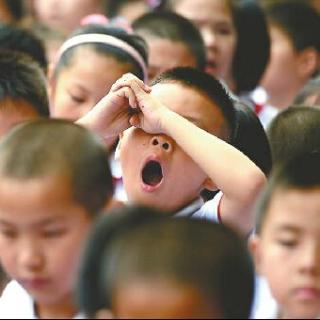
介绍:
20160617 OU 一中二外锵锵锵三人行
今日话题:学生党与早起的“爱恨纠葛”
BK: An American medical group is recommending schools start later for student sleep. So the thing is, lots of young people tend to be on a bit of a different sleep schedule than the rest of us, but at the same time, at least in the US, school starts pretty early for a lot of places. About ten percent of schools, according to one survey, start at 7:30 or before, but, I know at least my high school started just after that at 7:40, so it’s quite common and it causes no small amount of sleepy students and sleep deprivation.
NL: That’s early. I was slightly later than you guys – my school started at about 8:30, so I guess I had an extra hour’s sleep, but even then no one was doing anything in the first hour [BK: Right] – everybody was sleepy and not concentrating.
BK: Yeah – and that’s exactly the time the American Medical Association is recommending for middle and high school classes: 8:30; whereas others, both in the US and the UK, have suggested that, really, 10:00, especially for high school, would be a better time, as well as even for university students. But – well, kids stay up late, a lot, anyway, partially because they’re supposed to be shifted back, but then they have all this homework, and they have – they’re going to be up late pretty much regardless, and then they have to go to school very early. So this leads to, according to some research, less than a third of American teens getting at least eight hours of sleep on an average night. Now, I guess the widely accepted version of how much sleep we’re supposed to get as adults is 7-9 hours, and teens – you know, adolescents – need to get, I’m sure, at least eight hours, seven hours would not be doing the trick. So, obviously this is a problem – their bodies are thought to run up to three hours later than the rest of us, so, if you feel, you know, very much awake at 8:00 in the morning, that level of awakeness might actually only be felt by adolescents at say 11:00. Whereas if you feel sleepy at 8:00 at night, you may actually be feeling that sort of feeling of sleepiness only at 11:00 if you’re an adolescent.
WY: If they didn’t just delay the morning work, and then give the workers a nap time at midday, that can be optimal choices, because sometimes, people just need a little bit of relaxing time, or a nap time during midday, and then they can perform even better in the afternoon. But, in the morning, sometimes that is when important meetings are going on.
BK: What seems to be the best is, first to get enough sleep, no matter how you get it, you need to get enough sleep, and then especially for adolescents, getting it at the right time. Now, if you’re not able to get it at the right time, a nap may make up for it, but let me emphasize again the importance of getting enough sleep. In general, a lack of sleep, sleep deprivation, is thought to increase your susceptibility to illness, you know, you get sick more easily, and more often, you can gain weight, which is something many people would probably worry about, you are more likely to become depressed, and your performance, overall, is impaired, across everything. So if you care about your health, if you care about your weight, or your performance, it’s really important to get enough sleep.
NL: But as you said, it’s not that clear-cut when the right time is to be taking this sleep, because looking back into the past there seems to be some evidence to suggest that in pre-industrial kind of times, people would go to sleep in the evening, have a sleep for a few hours, and then wake up for a bit, go about their daily business – in the night – and then go back to sleep again until dawn, so they would have two separate sleeps, both in one night.
BK: However it is you’re going to get your sleep, make sure you get enough, and again it’s recommended, generally, 7-9 hours, and if you don’t you may pack on the pounds or kilos, so watch out for that, there.
大家还在听

